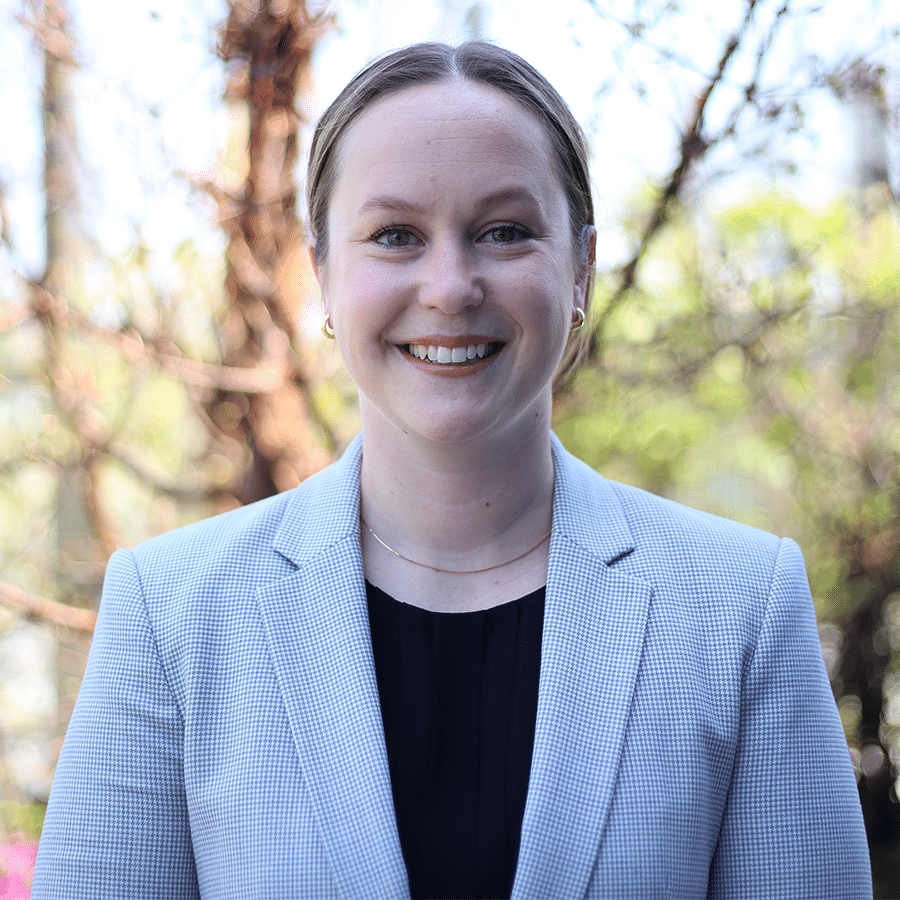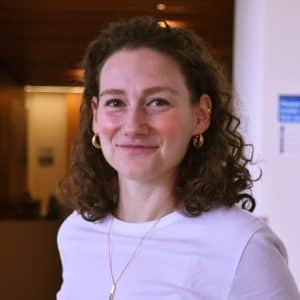Building the future
…of global public health
Current Fellows

DANA BEZUIDENHOUT, MPH
Dana Bezuidenhout (she/hers) is a fourth-year doctoral student in the Department of Epidemiology and a second-year pre-doctoral fellow in the Global HIV Implementation Science Research Training Fellowship. Her research focuses on tuberculosis (TB) and HIV. Ms. Bezuidenhout recently completed pre-doctoral training in the T32 Social Determinants of HIV training program, where she co-authored four manuscripts focused on HIV counseling and testing platforms for PrEP initiation in South Africa, identification of intervention preferences to support men’s engagement/retention in TB care in South Africa, reasons for missed opportunities to screen and test for TB in health care facilities, and PrEP disclosure and support for young women in South Africa. She has most recently completed a research rotation, where she assisted with the implementation design and data analysis of an R01 trial targeting TB transmission hotspots to find undiagnosed TB in South Africa. She is exploring how spatial mobility shapes TB transmission in South Africa and is conducting an analysis that assesses the effect of diabetes and prediabetes on TB treatment outcomes in a cohort of TB patients in Eswatini. She is also conducting analyses to assess how mobility patterns of cross-border migrant workers whose primary residence is in Lesotho but who work in South Africa affect their HIV outcomes and PrEP use. Ms. Bezuidenhout received a BA in Biology, Society, and the Environment with a certificate in Public Health in 2016 from the University of Minnesota and an MPH in Epidemiology with a certificate in Global Health in 2018 from Columbia University’s Mailman School of Public Health. Her research mentor is Dr. Yael Hirsch-Moverman.

ALEXANDER FURUYA, MPH
Alexander Furuya (he/him) is a second-year doctoral student in the Department of Epidemiology and a second-year pre-doctoral fellow in the Global HIV Implementation Science Research Training Fellowship. Mr. Furuya applies biostatistical methods to quantify the effects of social determinants of health on HIV prevention and care outcomes. His current projects include analyzing data from the Trying to Understand Relationships, Networks, and Neighborhoods in Transgender Women of Color (TURNTT) study. His research has contributed to findings relating incarceration, social connectedness, and sexual violence to HIV outcomes. Mr. Furuya received an MPH in Biostatistics in 2023 from Columbia University. His research mentor is Dr. Dustin Duncan.

NODAR KIPSHIDZE, MPH, MS
Nodar Kipshidze (he/him) is a first-year doctoral student in the Department of Epidemiology and first-year pre-doctoral fellow in the Global HIV Implementation Science Research Training Fellowship. Previously, he was a postgraduate associate in the Pitzer Lab at the Yale School of Public Health, where he used mathematical models to simulate and estimate the cost-effectiveness of various vaccine interventions for typhoid fever in both routine and outbreak settings. He was also a senior research analyst at the One Health Trust, where he explored the drivers of continued mpox persistence in the U.S. following the 2022 outbreak, using an agent-based network model. Additionally, Mr. Kipshidze collaborated on several methods projects, such as using neural networks for forecasting respiratory disease burden, incorporating exogenous processes into ODE-type epidemic models, and reconstructing synthetic populations for agent-based models. Lastly, he has a 7-year tenure leading global clinical programs in the pharmaceutical and medical device industries. Mr. Kipshidze received a BA in English in 2015 from Franklin & Marshall College, an MPH in Global Health in 2017 from New York University and an MS in Epidemiology in 2023 from Columbia University.

ELISE MARA, MPH
Elise Mara (she/her) is a second-year doctoral student in the Department of Epidemiology and a second-year pre-doctoral fellow in the Global HIV Implementation Science Research Training Fellowship. Ms. Mara’s main project involves applying innovative methods to characterize patterns of HIV care engagement and disengagement among people enrolled in PEPFAR-supported programs in sub-Saharan Africa, with the aim of guiding future interventions to help people with HIV remain in care. She has also collaborated with Dr. Susie Hoffman on an analysis of trajectories of change in PrEP readiness score across an intervention to increase PrEP uptake among young South African women, which will be presented as a poster at the HIVR4P conference in October 2024. Prior to her doctoral studies, Ms. Mara worked for the San Francisco Department of Public Health as a surveillance epidemiologist. Ms. Mara received a BS in Biological Sciences with a Pre-Medical certificate in 2014 from the University of Michigan-Dearborn and an MPH in Epidemiological Methods and Applications in 2016 from the University of Michigan. Ms. Mara’s research mentors are Dr. Mary Ann Chiasson and Dr. Bill Reidy.

SHANYAH MITCHELL, MPH
Shanyah Mitchell (she/hers) is a first-year doctoral student in the Department of Epidemiology and a first-year pre-doctoral fellow in the Global HIV Implementation Science Research Training Fellowship. Ms. Mitchell has spent the past year conducting research under the supervision of Dr. Delivette Castor using Population-based HIV Impact Assessment data from Lesotho to perform analysis focusing on the impact of anti-retroviral medication coverage guideline expansions on the average CD4 cell count levels amongst individuals living with HIV between 2016 to 2020. Prior to this she conducted an analysis to identify if any demographical and behavioral differences existed between men living in Lesotho who engaged in sexual partnerships with adolescent girls and young women and men who did not. Ms. Mitchell received a BA in Biological Sciences and Classics from Cornell University in 2022 and an MPH in Epidemiology with a certificate in Infectious Disease Epidemiology in 2024 from Columbia University Mailman School of Public Health.

SARA WALLACH, MPH
Sara Wallach (she/her) is a third-year doctoral student in the Department of Epidemiology and third-year pre-doctoral fellow in the Global HIV Implementation Science Research Training Fellowship. Ms. Wallach’s research focuses on evaluation of large-scale HIV programs, HIV prevention and PrEP, and risk factors for HIV in various populations. She is interested in examining denominators of “PrEP need” and conceptualizations of PrEP utilization and persistence. Her recent research has focused on health facility level evaluations of recency-based interventions and HIV self-testing using programmatic data and assessing the performance of PrEP eligibility criteria at predicting new infections in population-based HIV impact assessments. Ms. Wallach received her BA in Anthropology and Global Public Health from New York University in 2015 and an MPH with a certificate in Evaluation: International Health Programs from Johns Hopkins Bloomberg School of Public Health in 2020. Her research mentor is Dr. Matt R. Lamb.
Testimonials
“The training fellowship exposes you to cutting-edge implementation science research and researchers.”
The diversity of exposure through the weekly didactic sessions is such a unique opportunity to learn about the career paths and research of leaders in the field from across institutions.”
“I felt very supported in my mentor/mentee relationship and I was given formative opportunities to engage with diverse research teams.”
“A highlight of the fellowship was how the faculty-fellow seminars made me reevaluate how I though about my work—even when at first glance I did not think there was any direct connection between the two.”


